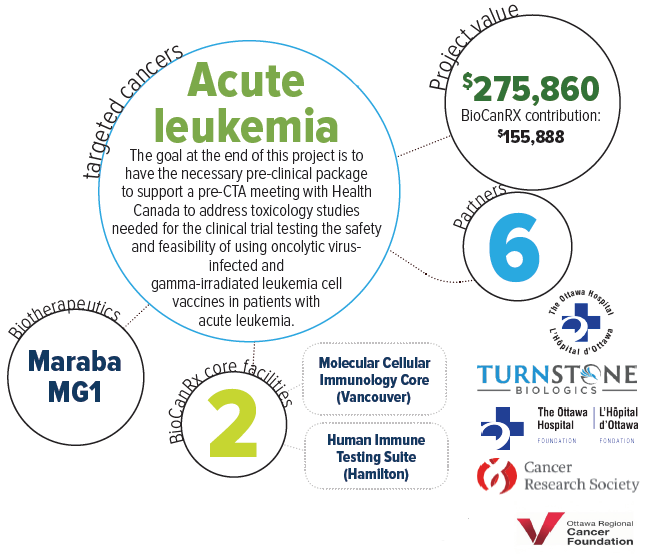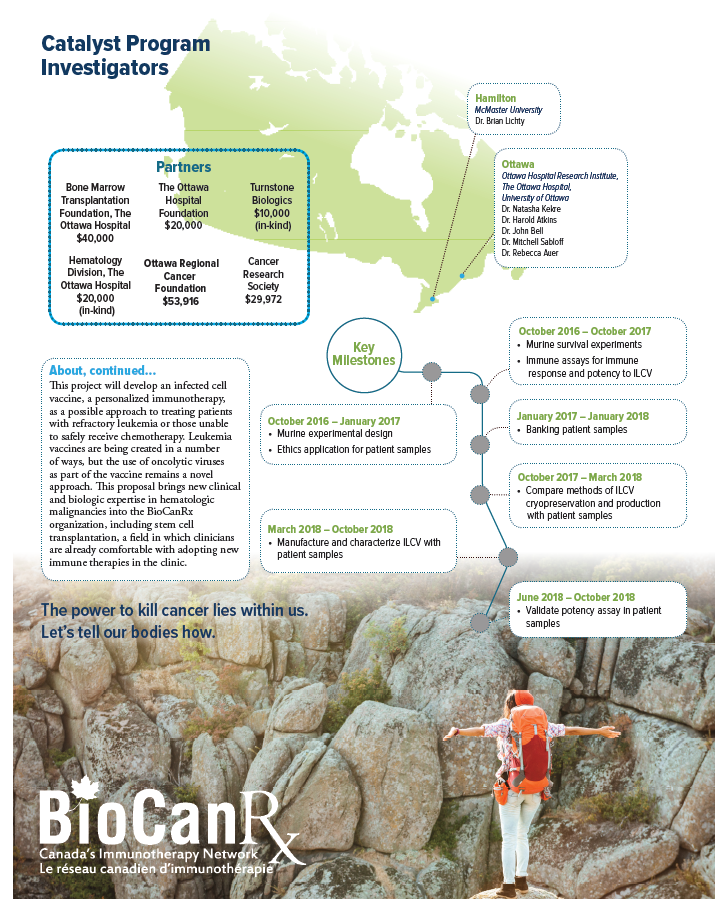Project summary: Catalyst Program
Infected cell vaccines in the treatment of acute leukemia: laying the groundwork for a clinical trial
Oct 14, 2016 to Oct 1, 2018
HIGHLIGHTS

- Personalized strategy with a virus-infected leukemia cell vaccine can offer more ammunition against acute leukemia
- Vaccine strategy combines cancer-killing viruses with the added ability to stimulate the patient’s own immune system against their leukemia
- Creates the foundation for further studies that will bring this new approach for the treatment of leukemia towards a clinical trial
- Leukemia vaccines are being created in a number of ways, but the use of oncolytic viruses as part of the vaccine is a novel approach

About this project
Acute leukemia is a type of blood cancer that remains difficult to treat with standard therapies, most of which are dangerous and associated with a high risk of complications and death. Despite aggressive chemotherapy and stem cell transplantation, less than 5% of patients with relapsed acute leukemia are cured. Patients with acute leukemia need more ammunition against their disease. This project proposes that a personalized strategy with a virus-infected leukemia cell vaccine can offer just that needed ammunition.
This vaccine strategy combines cancer-killing viruses, an existing BioCanRx technology, with the added ability to stimulate the patient’s own immune system against his/ her leukemia. This strategy would provide patients with a less toxic and more personalized approach to defeating leukemia. Based upon on their discovery that infected leukemia cell vaccines induce a protective leukemia specific immune response in mice, they propose to test in a clinical trial, whether vaccines created using a patient’s own leukemia cells infected with a cancer-killing virus and inactivated with radiation can protect against leukemic relapse. This infected cell vaccine will be tested in mice under conditions that mimic those of patients enrolled in such a trial. The initial experiments will be performed using the Maraba MG1 virus and murine leukemia cell lines. The proposed experiments will test the effect of chemotherapy on the infected cell vaccine response while further experiments will determine the ideal manufacturing and storage conditions needed for an effective vaccine. Completion of this project will create the foundation for further studies that will ultimately bring this new approach for the treatment of leukemia towards a clinical trial. This vaccine strategy will offer a uniquely tailored therapy to each patient with leukemia, providing patients with these aggressive cancers a chance at cure.
This project will develop an infected cell vaccine, a personalized immunotherapy, as a possible approach to treating patients with refractory leukemia or those unable to safely receive chemotherapy. Leukemia vaccines are being created in a number of ways, but the use of oncolytic viruses as part of the vaccine remains a novel approach. This proposal brings new clinical and biologic expertise in hematologic malignancies into the BioCanRx organization, including stem cell transplantation, a field in which clinicians are already comfortable with adopting new immune therapies in the clinic.


